#left authoritarian
Text
Social democrats, democratic socialists, maoists, leninists, marxists, and other brands of "left" authoritarians can fuck all the way off.
#social democrats#democratic socialism#democratic socialists of america#democratic socialists#maoists#leninists#authoritarianism#authoritarian state#anti authoritarian#left#antiauthoritarian#authoritarian left#left authoritarian#marxism#marxist leninist#marxist feminism#marxist memes#marxist theory#ausgov#politas#auspol#tasgov#taspol#australia#fuck neoliberals#neoliberal capitalism#anthony albanese#albanese government#antifascist#antinazi
10 notes
·
View notes
Text
You know maybe the horseshoe theory would've been abandoned long ago if certain self-proclaimed "leftists"* weren't so hell-bent to prove it right every five seconds.
(* they're about as much "leftists" as terfs are "feminists")
#tankies#i would like it not to be true as well#but if it walks like a duck and quacks like a duck etcetc.#leftist antisemitism#authoritarian left#authoritarianism#horseshoe theory#🧲#practically a circle these days
173 notes
·
View notes
Text
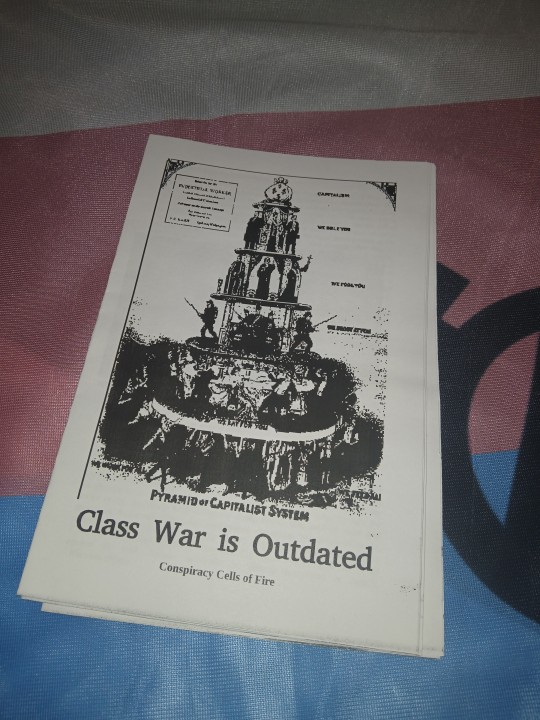
“Imagine, moreover, if all these protesters and indignant people were satisfied in terms of wages and regained the bourgeois dream of a country house, two cars and four televisions at the sole price of the ever-increasing impoverishment of immigrants, how quickly they would return to their comfortable couch…
…economic poverty is often not conducive to the prospect of anarchist liberation. It is no coincidence that in the past some of the fascist and totalitarian regimes were established on poverty and economic deprivation, after having presented themselves as the solution of salvation and exit from the crisis. Indeed, the impoverished masses often saw Hitler or Mussolini as their redeeming leaders. After all, it was ‘the poor people’ themselves who brought these scumbags to power through elections. This is because for someone who is financially desperate, usually his priority is to save by any means the basic necessities of life.
He is not in the mood to consider that there is a different life proposition that is not ruled by inequality and exploitation. What he is concerned with is a proposal or at least a promise that will now get him out of his impasse.”
Read here.
#anarchism#anti authoritarian#anarcho nihilism#class struggle#ccf#individualist anarchism#post left anarchy
49 notes
·
View notes
Text
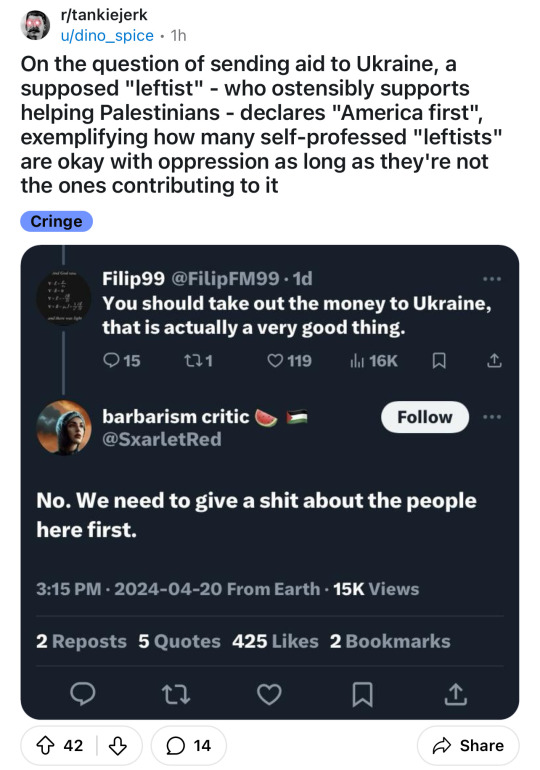



“America first” indeed.
Bad when America does it, ❤️ when Russia does it.
I’ve lost track of the number of times I’ve had to do a quick double take to see if it was a tankie or a rightwing Republican talking. If you examine it and listen closely, it’s really amazing how much their rhetoric overlaps. Sometimes the Venn diagram is just a big ole circle, which isn’t surprising because both parties care about the suffering of others ONLY if they like the people being harmed. Otherwise it’s cool indifference or worse, because they’re good with authoritarianism, imperialism and colonialism, because “communism” ☭ or some such bullshit. Completely morally and intellectually inconsistent with the beliefs they espouse.
Indistinguishable from conservative rhetoric.
#politics#ukraine#russia#tankies#authoritarians#russian imperialism#russia is a terrorist state#russian invasion of ukraine#russian colonialism#authoritarianism#russian fascism ☭#i would say its horseshoe therory#except tankies arent actually in the real left#they are just ‘adults’ whose political growth was stunted at ☭#if somehow there was a resolution to bomb israel watch how fast the logic would change#they would tell americans to starve to death until afterwards#and this isnt me defending the terrorist state of israel#im just pointing out the hypocrisy
38 notes
·
View notes
Text

look i think professor utonium can be very attractive but his nipples look like they're on a political compass chart and that's really not sexy
#authoritarian left AND right????#just..... ick!#but for real him having a plus sign on his chest does not uhhhhh evoke a chest to me it just looks weird#am i alone in this???#like no wonder they hate him#plus…… the flipper feet………….. 🤢
44 notes
·
View notes
Text
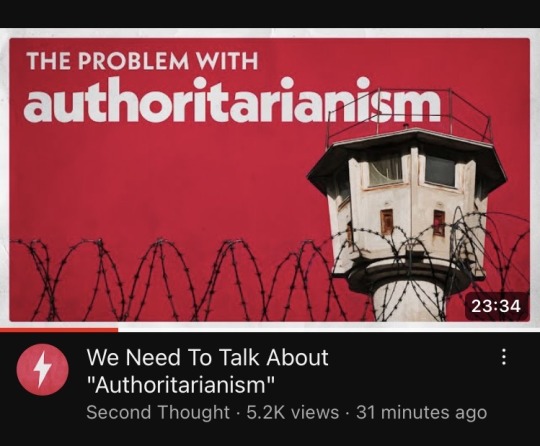
Here’s my personal recommendation of a YouTube video to check out:
youtube
#authoritarianism#authoritarian state#political#political posting#politics#leftist#leftism#leftisim#left wing#left wing politics#leftist politics#socialist#socialism#communist#communism#Marxist#marxist leninist#marxism#video essay#tumblr recommendations#recommend#recommendation#youtube#youtube content#youtube recommendations#youtube video#video recommendation#youtube link#video link#please watch it
55 notes
·
View notes
Text
Ideologies are based on Sapplyvalues
#polls#plz reblog#politics#left wing#leftism#right wing#progressivism#conservatism#liberalism#authoritarianism#centrism
40 notes
·
View notes
Text


This past International Workers Day, otherwise known as May Day, I attended my local rally. The same old May Day groups were in attendance, Party for Socialist Liberation (PSL), Communist Party USA (CPUSA), Democratic Socialists of America (DSA), and a couple other single issue labor groups. The endless tedium of speeches aside, something strange stood out to me. Every group called for left unity in some way or another. “Unite as workers to crush capitalism,” was the exact quote from the young man in running shoes, jeans, and a bright red PSL shirt. I could have spoken up and made a scene, again, but I feel it is more effective to broadly address why this call for left unity is absurd especially considering the Marxist historical revisionism surrounding May Day. The success of May Day was directly because of the anarchist Haymarket Martyrs and the Marxist attempt to ignore this fact is one of the many reasons why left unity is never in the best interest of anarchists.
Before we begin, it is important to go over the events of the Haymarket uprising on May 4th, 1886. The first May Day was called for by the Federation of Organized Trades and Labor Unions (FOTLU) as the official first day the eight-hour workday in 1886. On May 1st 1886, between 30,000 and 80,000 laborers in Chicago refused to work in support of the eight hour day, which shut down the industrial zones. August Spies, a German-born anarchist and leading contributor to the newspaper Arbeiter-Zeitung, was enthused by the unity and relative success of the eight-hour fight.[1] The McCormick Reaper Works’ solution, instead of meeting the demands of the workers, was to hire scabs. On May 3rd, 1886, striking workers from the McCormick Plant asked Spies to come down to the Southwest side of Chicago and give a speech to bolster morale. Minutes into Spies speech, the scabs began filing out of the plant and the McCormick strikers rushed to the gates of the factory. To protect the business and scabs, 200 police officers rushed in and beat the strikers with clubs and shot them with pistols. According to Spies, 6 strikers were killed including those that were shot in the back as they fled. Spies knew that the battle had been lost and returned to his newspaper office with the sound of screams and pistol fire still ringing in his ear.
That night, August Spies rushed into print several thousand leaflets urging workingmen to come to a meeting the next day, May 4th, at Haymarket Square.[2] The next day, the anarchists August Spies, Albert Parsons, and the Rev. Samuel Fielden spoke to a crowd estimated variously between 600 and 3,000. At around 10:30 PM as Fielden spoke, the police showed up despite the peaceful nature of the crowd. As they ordered the crowd to disperse, a bomb was thrown into the advancing officers, killing 6. The Police then opened fire on the anarchists killing 4 and some of the anarchists returned fire killing another police officer. The Police argued it was a conspiracy and eight influential anarchists were arrested, including Spies and Parsons, who were not present but had significant influence in the community. On November 11th 1887, 4 convicted anarchists including Spices, Parsons, Adolph Fischer, and George Engle were hanged. The state executions further enraged the broader community and would be the catalyst for the International Workers Day.
The Haymarket Uprising was internationally significant. During the funeral procession for the anarchists in Chicago, the historian Philip Foner estimates, between 150,000 and 500,000 people lined the streets in support. Both the American Federation of Labor and the Knights of Labor, although initially reluctant, supported the slain anarchists as heroes of labor. The Knights of Labor even published the autobiographies of Parsons, Spies, Fischer, Engle, and the anarchist who killed himself in prison, Oscar Neebe.[3] The London Freedom group argued “No event in the worldwide evolution of the struggle between socialism and the existing order of society has been so important, so significant, as the tragedy of Chicago.”[4] According to the historian Paul Avrich, pamphlets and articles about the case and autobiographies of the martyrs appeared in every language across the world. In Europe, over twenty-four cities boasted sizeable protests in support of the Haymarket Martyrs.[5] Famous anarchists like Emma Goldman, Alexander Berkman, and Ricardo Flores Magón all attribute the Haymarket uprising to their radicalization. Moreover, it was not only Europe that celebrated the Haymarket Martyrs. The Times of London reported protests in Cuba, Peru, and Chile.[6] Mary Harris “Mother” Jones was in Mexico on May Day, 1921, and wrote that their May Day was expressly in honor of “the killing of the workers in Chicago for demanding the eight-hour day.”[7] More to this point, during a trip to Mexico in 1939, Oscar Neebe’s grandson was shown a mural by Diego Rivera in the Palace of Justice depicting the Haymarket Martyrs.[8] The international significance of the Haymarket Martyrs was undeniable in the hearts and imagination of all of the Left and is a significant element in the success of May Day.
The success of May Day internationally is thanks to the slain anarchists yet Marxist leadership intentionally omitted the significance of the Haymarket Martyrs to further purge anarchism from the historical record. In 1889, just a few years after the execution, the Marxist International Socialist Congress, who would later form the “Second International,” chose May 1st to celebrate international workers. However, nowhere in the Second International’s proclamation was the slightest mention of anarchism or the Haymarket Martyrs’ sacrifice for the eight-hour workday. The historian Philip Foner in 1969 therefore needed to write an entire book to remind the reader that other than pushing for the eight-hour workday, the secondary purpose of the establishment of International Workers Day on May 1st was to honor the Haymarket Martyrs. He argues “there is little doubt that everyone associated with the resolution passed by the Paris Congress knew of the May 1st demonstrations and strikes for the eight-hour day in 1886 in the United States … and the events associated with the Haymarket tragedy.” [9]
This slight against anarchists should come as no surprise considering the Second International broke with the First International Workingmen’s Association to exclude anarchists. The few anarchist members that refused to leave the Second International were barred from contributing. Member William Morris reveals, “expressions of anarchist ideas were often shouted down, and in one incident Francesco Saverio Merlino faced violence from the other delegates.”[10] The later Soviets were no stranger to historical revisionism either. Whether it is Stalin painting himself into pictures alongside Lenin or more typically painting out figures, like Trotsky, from the historical narrative. Famous member of the Communist Party USA’s central committee and founder of International Publishing, Alexander Trachtenberg, published the definitive “History of May Day” in 1932 and did not mention the word anarchism once.[11] Therefore, the Marxists of the Second international developed the May Day holiday to appropriate the international success of the anarchist Haymarket martyrs, while actively excluding anarchist thought from their sphere of influence.
Rosa Luxemburg also actively excluded mentioning the Haymarket Martyrs, which prominent Social Democrat publications like Jacobin choose to publish to further marginalize anarchist ideas. In 2016, Jacobin magazine published Luxemburg’s “What are the Origins of May Day.” In this article, Luxemburg argued that in 1856, the Australian workers call for complete work stoppages in support for the 8-hour workday influenced the American and then International development of May Day.[12] She claims that the Australians call to action was the primary source of inspiration for The International Workers Congress in 1890. While this is most likely true, she does not mention anarchists at all in her story. Not only did Luxemburg choose to ignore the impact of the Haymarket anarchists, but Jacobin’s intentional publication of her work in 2016 illustrated this same interest in erasure. Therefore, it becomes clear that both the Communists and the contemporary Social Democrats reinterpret history in order to ignore the global impact of anarchism on the working-class.
This active historical revisionism from popular Marxists is what makes May Day speeches calling for “left unity” ridiculous. Let us, for a moment, ignore the legacy of anarchist oppression from the Soviet Union to Cuba. The fact that both the Second International to contemporary Marxists willfully ignore the centrality of anarchism to organized labor and the establishment of the eight-hour workday is ahistorical. The fact that they suppress anarchist history and call for unity on the day that anarchist ancestors gave their lives for labor’s cause is bullshit. The eight-hour work day was a compromise for the abolition of waged labor. Let us not compromise our principles again by unifying with Marxists that work to undermine us at every opportunity.
[1] August Spies, “The Dies are Cast!”Arbeiter-Zeitung (May 1, 1886)
[2] August Spies, “Revenge,” Arbeiter-Zeitung (May 3, 1886)
[3] Philip Foner, “Editor’s Intro” in The Haymarket Autobiographies ed. Philip Foner (Ann Arbor, MI: University of Michigan Press, 1969), 12.
[4] Paul Avrich, The Haymarket Tragedy (Princeton NJ: Princeton University Press, 1984), 436.
[5] Philip Foner, May Day (New York, NY: International Publishers, 1986), 45-46.
[6] Foner, May Day, 45-46.
[7] Dave Roediger, “Mother Jones & Haymarket”, in Haymarket Scrapbook ed. Franklin Rosemont, David Roediger (Chico, CA: AK Press, 2011), 213.
[8] Paul Avrich, The Haymarket Tragedy (Princeton NJ: Princeton University Press, 1984), 436.
[9] Phillip Foner, May Day, 42.
[10] William Morris, “Impressions of the Paris Congress: II,” Marxists.org (Retrieved May 4, 2022) https://www.marxists.org/archive/morris/works/1889/commonweal/08-paris-congress.html
[11] Alexander Thrachtenberg, “The History of May Day” Marxist.org (accessed May 5, 2022) https://www.marxists.org/subject/mayday/articles/tracht.html
[12] Rosa Luxemburg, “What are the Origins of May Day?” Jacobin, May 1, 2016 (Accessed May 2, 2022) https://jacobinmag.com/2016/05/may-day-rosa-luxemburg-haymarket
#may day#history#labor#1800s#authoritarian left#communism#Haymarket#Jacobin#labor organizing#Labor Union#Rosa#Rosa Luxemburg#second international#the left#anarchism#resistance#autonomy#revolution#community building#practical anarchism#anarchist society#practical#anarchy#daily posts#anti capitalist#anti capitalism#late stage capitalism#organization#grassroots#grass roots
18 notes
·
View notes
Text
Statists: “If you don't vote, you don't get to complain”
Anarchists:

#conservatives are morally bankrupt#insane leftists#democracy is not freedom#voting is slavery#voting is not a right#voting doesn't help#minarchy is fascism#the anarchists#anarchists#statism#authoritarianism#left wing statists#right wing statists#left wing idiots#right wing idiots
41 notes
·
View notes
Text
Anti Taylor Swift sentiment is now at the point where people will admit they would prefer marry a fascist than someone who likes a famous pop singer
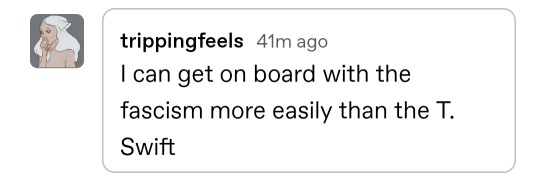




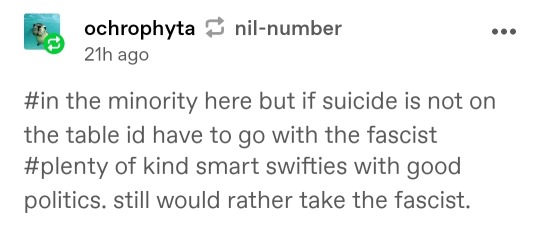
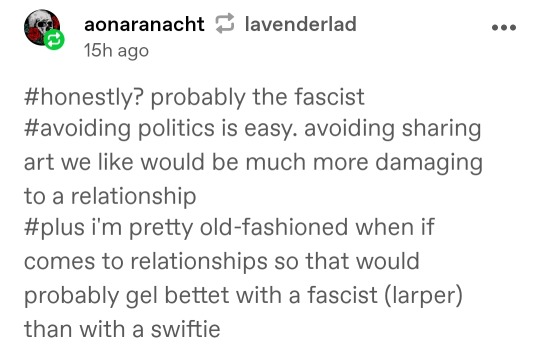
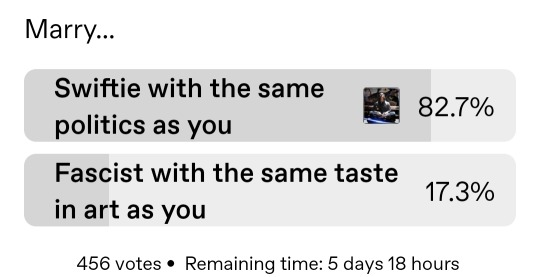

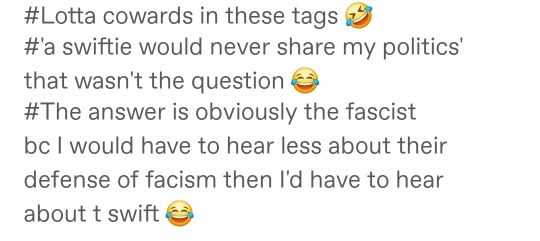
(Also the amount of people who take music as a political choice is kind of insane. "A swiftie would never have my politics" so your politics are rooted in only seeking out art from completely morally pure ethical places that aren't at all ingrained in the capitalistic system you live? That's an impossible endeavour, and yeah, I guess our politics don't align. But I also don't think your politics are what you're claiming then. Especially if you need some way to get around "obviously i would prefer marry someone who likes different music than me than a fucking fascist")
#granted what do i know about self proclaimed communists on the internet. I suppose as far left as I personally am I do tend away#from authoritarianism bc of how much i want to value autonomy#incoherents#taylor swift
16 notes
·
View notes
Text
.
#this is stepping onto fraught ground and i'm prefacing it with my own position as a non-jewish non-muslim white american#but the past 2 months i've felt myself experiencing a falling out with online leftist circles over the denial/cheering on of oct 7 violence#and more generally the authoritarian/tankie-adjacent turn i've noticed happening over the past several years in a lot of leftist circles#and it has me looking for examples of a left politics that takes pacifism and the sanctity of all human life as serious ethical principles#which i think is what is pointing me increasingly toward christian anarcho-pacifism and people like leo tolstoy and dorothy day#it's not necessarily the christianity that is essential to me although my own faith journey has been leading in that direction for years#but that i see commitment to the sanctity of all human life and refusal to celebrate or glorify violence as non-negotiables#this is not to say that i see violence as never justified under any circumstance. but the tendency for (esp. white and western) leftists#to cheer it on provided that it is deemed suitably anti-colonial and liberatory is indicative of something that has gone very wrong#also: none of this should in any way be taken as contradicting my fundamental support for the freedom of the palestinian people
27 notes
·
View notes
Text
i have literally been unpacking the fukuchi/fukuzawa situation since watching last night and while i feel sorry for fukuchi and i empathize with him and his motives, i still highkey do not LIKE him.
now that we've seen the culmination of his arc, i was right that his major M.O./character trait is to deny people choice, even IF denying people choice is to save them. using the book. using one order. fucking with literal time and space to negate the choices of OTHERS.
and then finally what he pulled with fukuzawa at the end there.
and like? that behavior is SUPER antithetical to BSD's anti-authoritarian core themes as a whole. think about dazai's speech to kyouka...that the only thing people truly have is the ability to make choices and to agonize over those choices.
even by LITERALLY DYING, he's denied fukuzawa the right to choose his role in this. even if fukuzawa can't kill him, he'll die anyway, and burden fukuzawa with a role he DOES NOT WANT, and a choice that he KNOWS will cause him immeasurable pain.
and seriously??? i don't think he would leave that choice to fukuzawa unless he knew there was a high chance fukuzawa would go through with his plan.
(hell, fukuchi's entire relationship with teruko--his closest confidant, the only OTHER person he seems to trust--is based in unwavering, unquestioning loyalty. to the point where she'll kill him JUST because he ordered her to, in spite of the fact that this is literally the last thing she wants to do.)
and like...i definitely don't think the ramifications of fukuchi's actions are over yet whatsoever. like, shit. obviously.
if anything, i think the theme of choice is going to come back around big time. fukuzawa has, uh, some big decisions to make lmao, and i'm hoping that more rational characters like dazai and mori have some bearing on those choices.
more than anything, i'm hoping that ranpo finally asserts himself with fukuzawa and pushes him toward an answer that doesn't involve self-sacrifice.
(this is going to get messy...i'll be surprised if it doesn't.)
i think the best outcome here is the story playing with the idea that humanity is collaborative. no one person should EVER have the power to control others. our actions effect each other, for better or worse. we all deserve to have a say in what happens.
that's literally baked into fukuzawa's character! he says it on screen RIGHT before this happens! so to see him struggling with this is...concerning and painful, even though i genuinely think (I HOPE???) he'll make a rational choice here. even if it's a struggle to make.
but...idk. yeah. i feel sorry for fukuchi, i really do, but i don't think he's a good guy in this story by a longshot.
#fukufuku#fukuchi#fukuzawa#bsd meta#bsd s5#bsd spoilers#im unpacking!!! there's a lot to unpack!!!#fukuchi is one of those characters where its like...man i just cannot get behind him. i like that he's sympathetic but also like#he's the worst?? he's absolutely the worst.#he's got like all of mori's and dazai's controlling behaviors turned up to eleven with NONE of the self-awareness!!!#also i am bracing myself for an increase in authoritarian left fascism discourse in the BSD fandom lmao#i exactly don't trust the “kill urself prosh*pper” fandom to not be like#''uhmm fukuchi is right and fascism is good actually if it controls and eliminates Bad Guys aka the ppl i dont like :)"#wow that got heavy there lmao#anyway i feel ~insane~ how are all of you holding up??
53 notes
·
View notes
Text
youtube
Warning: this film contains flashing lights, bright colours and loud, sudden noises. Some people might experience motion sickness in this 360 degree virtual reality film.
Prepare to step into the virtual reality world of Too Much Information. Sometimes, autistic people become overloaded by everything around them. That can make the outside world feel like a terrifying place. And for their families, all the looks, judgements and tuts make it feel like a lonely and isolated place. That’s why we’ve created a virtual reality experience in collaboration with autistic adults and children. So you can feel every single sight, every single sound, every single stare they endure on a simple trip to the shopping centre.
So stay calm, take a breath and make sure your headphones are plugged in. The question is: Will you make it to the end?
They build a hyper autism torture realm to for nuerotypicals to experience the overstimulation
anyway, good work Autism Reality
#in the authoritarian left we sentence you to 4 hours in “THE ROOM” for counter-revolutionary thought#autism#Youtube
9 notes
·
View notes
Text
By: Matt Johnson
Published: Jan 27, 2023
“Christopher Hitchens: From socialist to neocon.” It was an irresistible headline because it’s a story that has been told over and over again. The novelist Julian Barnes called this phenomenon the “ritual shuffle to the right.” Richard Seymour, who wrote a book-length attack on Hitchens, says his subject belongs to a “recognisable type: a left-wing defector with a soft spot for empire.” By presenting Hitchens as a tedious archetype, hobbling away from radicalism and toward some inevitable reactionary terminus, his opponents didn’t have to contend with his arguments or confront the potentially destabilizing fact that some of his principles called their own into question.
Hitchens, who died in 2011, didn’t make it easy on the apostate hunters. To many, he was a “coarser version of [conservative commentator] Norman Podhoretz” when he talked about Iraq, and a radical humanist truth-teller when he went on Fox News to lambaste the Christian right: “If you gave Falwell an enema,” he told Sean Hannity the day after Jerry Falwell’s death, “he could be buried in a matchbox.” Then he gave Islam the same treatment, and he was suddenly a drooling neocon again. He defied easy categorization: a socialist who spurned ideology, an internationalist who became a patriot, a man of the left who was reviled by the left.
The left isn’t a single amorphous entity—it’s a vast constellation of (often conflicting) ideas and principles. Hitchens’s style of left-wing radicalism is now out of fashion, but it has a long and venerable history: George Orwell’s unwavering opposition to totalitarianism and censorship, Bayard Rustin’s advocacy for universal civil rights without appealing to tribalism and identity politics, the post-communist anti-totalitarianism that emerged on the European left in the second half of the twentieth century.
Hitchens described himself as a “First Amendment absolutist,” an echo of historic left-wing struggles for free expression—from Eugene V. Debs’s assertion of his right to dissent during World War I to the Berkeley Free Speech Movement. Hitchens argued that unfettered free speech and inquiry would always make civil society stronger. When he wrote the introduction to his collection of essays For the Sake of Argument in 1993, he had a specific left-wing tradition in mind: the left of Orwell and Victor Serge and C.L.R. James, which simultaneously opposed Stalinism, fascism, and imperialism in the twentieth century, and which stood for “individual and collective emancipation, self-determination and internationalism.”
Hitchens’ most fundamental political and moral conviction was universalism. He loathed nationalism and argued that the international system should be built around a “common standard for justice and ethics”—a standard that should apply to Henry Kissinger just as it should apply to Slobodan Milošević and Saddam Hussein. He believed in the concept of global citizenship, which is why he firmly supported international institutions like the European Union. He didn’t just despise religion because he regarded it as a form of totalitarianism—he also recognized that it’s an infinitely replenishable wellspring of tribal hatred.
He also opposed identity politics, because he didn’t think our social and civic lives should be reduced to rigid categories based on melanin, X chromosomes, and sexuality. He recognized that the Enlightenment values of individual rights, freedom of expression and conscience, humanism, pluralism, and democracy are universal—they provide the most stable, just, and rational foundation for any civil society, whether they’re observed in America or Europe or Iraq.
And yes, he argued that these values are for export. Hitchens believed in universal human rights. This is why, at a time when his comrades were still manning the barricades against the “imperial” West after the Cold War, he argued that the North Atlantic Treaty Organization should intervene to stop a genocidal assault on Bosnia. It’s why he argued that American power could be used to defend human rights and promote democracy. As many on the Western left built their politics around incessant condemnations of their own societies as racist, exploitative, oligarchic, and imperialistic, Hitchens recognized the difference between self-criticism and self-flagellation.
-
One of the reasons Orwell accumulated many left-wing enemies in his time was the fact that his criticisms of his own “side” were grounded in authentic left-wing principles. When he argued that many socialists had no connection to or understanding of the actual working class in Britain, the observation stung because it was true. Orwell’s arguments continue to sting today. In his 1945 essay “Notes on Nationalism,” he criticized the left-wing intellectuals who enjoy “seeing their own country humiliated” and “follow the principle that any faction backed by Britain must be in the wrong.” Among some of these intellectuals, Orwell wrote: “One finds that they do not by any means express impartial disapproval but are directed almost entirely against Britain and the United States. Moreover they do not as a rule condemn violence as such, but only violence used in defense of the Western countries.”
Hitchens observed that many on today’s left are motivated by the same principle: “Nothing will make us fight against an evil if that fight forces us to go to the same corner as our own government.” This is a predictable manifestation of what the American political theorist Michael Walzer calls the “default position” of the left: a purportedly “anti-imperialist and anti-militarist” position inclined toward the view that “everything that goes wrong in the world is America’s fault.”
Indeed, the tendency to ignore and rationalize even the most egregious violence and authoritarianism abroad in favor of an obsessive emphasis on the crimes and blunders of Western governments has become a reflex. Much of the left has been captured by a strange mix of sectarian and authoritarian impulses: a myopic emphasis on identitarianism and group rights over the individual; an orientation toward subjectivity and tribalism over objectivity and universalism; and demands for political orthodoxy enforced by repressive tactics like the suppression of speech.
These left-wing pathologies are particularly corrosive today because they give right-wing nationalists and populists on both sides of the Atlantic—whose rise over the past several years has been characterized by hostility to democratic norms and institutions, rampant xenophobia, and other forms of illiberalism—an opportunity to claim that those who oppose them are the true authoritarians. Hitchens was prescient about the ascendance of right-wing populism in the West, from the emergence of demagogues who exploit cultural grievances and racial resentments to the bitter parochialism of “America First” nationalism. He understood that the left could only defeat these noxious political forces by rediscovering its best traditions: support for free expression, pluralism, and universalism—the values of the Enlightenment.
Hitchens closes his book Why Orwell Matters with the following observation: “What he [Orwell] illustrates, by his commitment to language as the partner of truth, is that ‘views’ do not really count; that it matters not what you think, but how you think; and that politics are relatively unimportant, while principles have a way of enduring, as do the few irreducible individuals who maintain allegiance to them.” Despite the pervasive idea that Hitchens exchanged one set of convictions for another by the end of his life, his commitment to his core principles never wavered. They are principles that today’s left must rediscover.
Matt Johnson is a journalist and the author of the forthcoming book, How Hitchens Can Save the Left: Rediscovering Fearless Liberalism in an Age of Counter-Enlightenment, from which this piece is excerpted.
#Matt Johnson#How Hitchens Can Save the Left#liberalism#liberal ethics#universalism#pluralism#freedom of speech#freedom of expression#free speech#first amendment#identity politics#identarianism#woke authoritarianism#authoritarianism#tribalism#religion is a mental illness
22 notes
·
View notes
Text

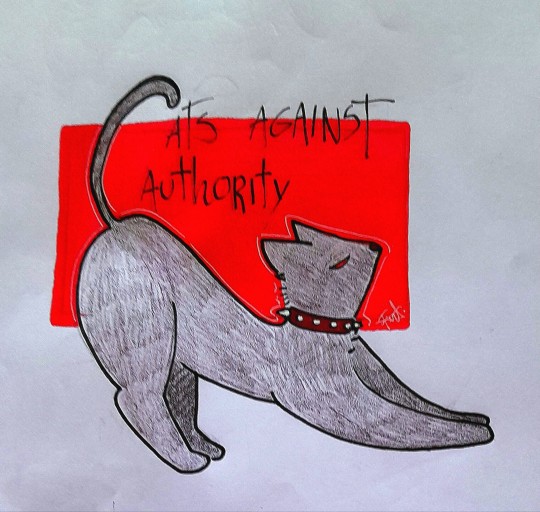
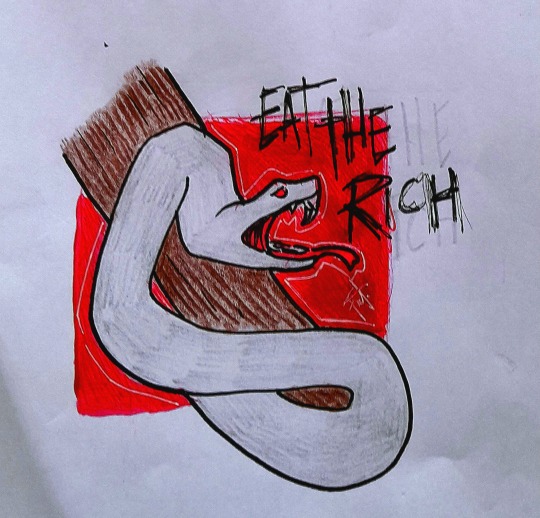
My children
#when the poor have nothing left to eat#they will eat the rich#anti authoritarian#all cats are beautiful#eat the rich#bright red#traditional art#artists on tumblr#mixed media#punk
16 notes
·
View notes
Text
I need people to understand that Musk destroying Twitter by going after its usability is a deliberate and insidious choice
He doesn’t care that he’s gonna lose $44billion because the tool he’s systematically tearing apart each day was the tool used by journalists, lawyers, academics, doctors, scientists, activists and so many more valuable experts to disseminate vital information and it was being used to organize people, speak truth to power, and to fight authoritarian despots wherever it was accessible. Ffs search and rescue operations esp after natural disasters for YEARS relied on Twitter to determine where their help was needed most and which areas were in need of what resources.
Elon is a moron and don’t get me wrong I love laughing at his expense too but it’s so clear to me that while he’s certainly no evil mastermind he’s definitely making very deliberate choices right now.
When Twitter dies, those experts will probably move on to different apps. They’ll be scattered and you won’t follow everyone to 17 different apps. That’s the point of this takeover and rebranding and Twitter blue and dm limits. He wants to drive out users, get rid of features which enable people to organize and campaign. He wants people to question each others credibility. He’s gonna make back that $44 billion. Didn’t his net worth quadruple during the fucking pandemic?? He’ll continue to be hero worshipped by his cult of blue-check zombies and one of the greatest (albeit riddled w it’s own brand of flaws and issues) tools of communication will die a slow, painful, and embarrassing death. Not w a bang but w a whimper.
#twitter#I’m half asleep rn so idk if this made sense#but yeah this is what worries me#the rebranding is another attempt to sabotage what little (negligible tbh) credibility or recognition for that matter Twitter has left#stupid man dumb motherfucker I hope he gets run over by a steam engine train#fuck Elon musk#dumb bitch#personal#like I wonder which authoritarian regime is backing him on this#the saudis?#the Chinese?#Russia????#putin actually might now that I tbh n abt it#but sleepy me go bed bye bye
37 notes
·
View notes